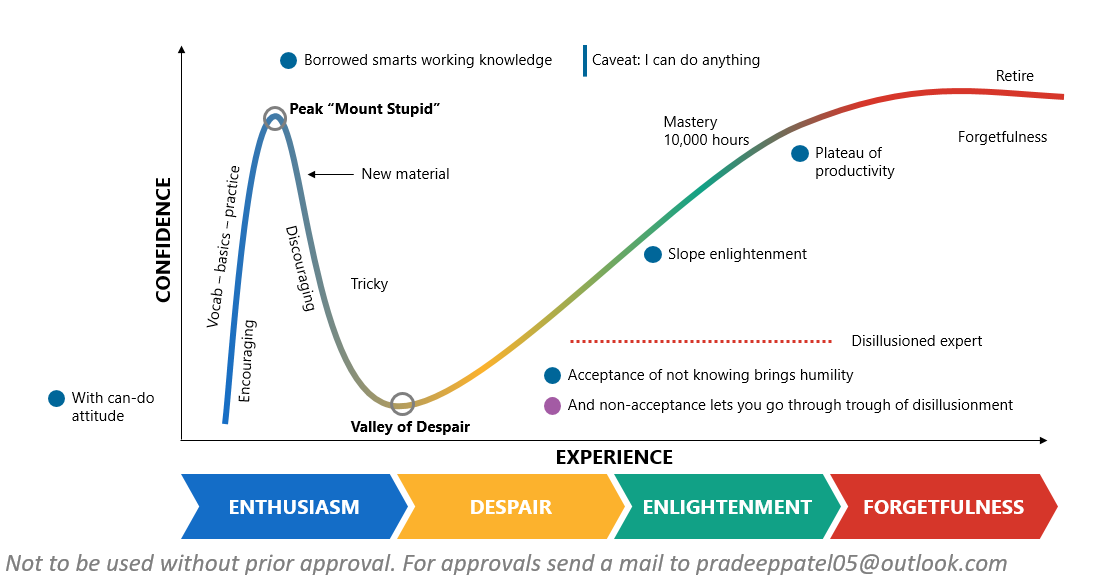
Self Improvement- Dunning Kruger Effect
The Dunning Kruger Effect explains illusion of competence at the start of learning something new to the point of ignorance.
It begins with a false sense of confidence to try something new for the first time. It changes with time by realizing there is a lot to learn and gradually move towards the alignment phase.
This is an excellent model for explaining a type of cognitive bias that lets people overestimate their abilities. Especially in areas where they have little or no experience.
This is easily evident and retraceable to our daily corporate life. You would be in agreement when I say that any new entrant to the team (equally applicable to your new boss or a junior team member) come up an additional bundle of enthusiasm and “Overconfidence” (mistaken for additional skills, new tool, and prior knowledge and at times just for the excellent theoretical concepts that these individuals possess).
While this success illusion would spread like “wild-fire” and everyone would be impressed and praise the new changes, it is short lived and reaches “Mount Stupid” in no time.
This is one of the worst Catch -22 situations
Recently acquired bias makes people unable to recognize their lack of experience and knowledge to succeed in the role and on top of it, the false confidence makes it impossible to make them realise that they lack experience and knowledge.
While they should focus on these 2 success factors( experience and knowledge), they unintentionally keep feeding their recently found “Elevated Ego”
First Timers (Accidental Managers, First Time Executives/Leads/Architects, First Time VPs and other equivalent Senior Roles), are more likely to succumb to this as they try to fit the bill by using the existing skillsets (instead of focussing on acquiring new skills and learnings required for the role) and as evident in this model, this works initially like a charm and leads to solidification of the bias.
Beginners, with minimum knowledge get an initial boost of confidence when exposed to new skills, tools, or terms to talk about. It is called the peak of “mount stupid”.
I will not be wrong in assuming that all of us have would have experienced scenarios where New Senior Executive who was doing so well, in no time is “Asked To Leave/Fired/Resigned” from the position. From this model perspective, that happens when the “Valley of Despair” hits hard because the more you know, you realize how much you don’t know and as learner continues to gain knowledge( worst would be if they don’t learn), the confidence levels began to drop i.e. “Valley of despair”.
This is the time where things can go in any direction. Learning-unlearning-Relearning the required skills (people, technology, infra, negotiations) makes the slope of confidence and competence move from slope of enlightenment to plateau of sustainability
This model has been used extensively across industries to identify cognitive bias. A great example is Gartner Hype Cycle .
This model can be effectively used for recognizing and improving own performance at work. Likewise, the Dunning-Kruger Effect has been used in machine learning and artificial intelligence for basics of learning.

Solving Retail & Business Onboarding in UAE | National Manager, UAE (Founding Member of Signzy UAE)
2yWell articulated!